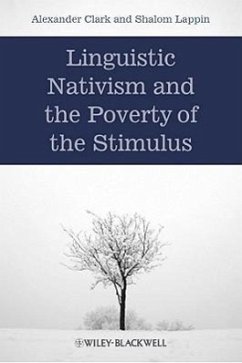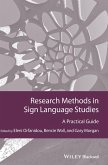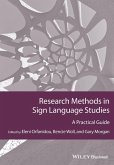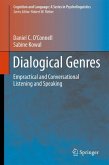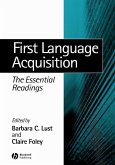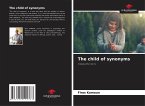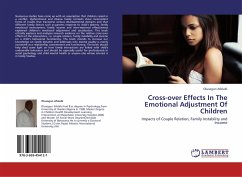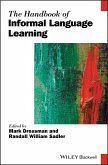Linguistic Nativism and the Poverty of the Stimulus explores the question of how children acquire knowledge of their native language, one of the most difficult and long-standing problems in cognitive science. For the past fifty years linguistics and psychology have been dominated by the view that the linguistic input which children receive is insufficient to explain the rich and rapid development of their knowledge of their first language(s) through general learning mechanisms. This view holds that humans have a specialized, innate ability to learn language, which is species-specific. Clark and Lappin critically examine different forms of the argument from the poverty of the stimulus (APS) in connection with the architecture of the mind, the evolution of language, and formal models of learning. With cogent explanations of machine learning and computational complexity in learning, The book argues that if we make realistic assumptions about the way in which children actually learn their native language, then it is possible to explain this process largely through general methods of induction that extract structure and patterns from data across many different kinds of information. The authors, one a computational linguist and the other an expert in computational learning theory, have collaborated to produce a work that will surely spark further debate and research.
"This book is not only very pertinent, but also succeedsin eschewing most of the polemical excess that tends to engulf usall in this field It's not an easy book.. but I thinkit gives some sense of what the enterprise is about. AlexClark describes it, at one point, as an exercise in clearing theground - and it succeeds in sweeping away certain comfortableassumptions that are often made in this area, concerning (forinstance) the irrelevance of negative evidence, what languages areprovably unlearnable, and the role of the Chomskyhierarchy." (New Books in Language, 8 June2012)
"Most of all, it challenges basic concepts inmainstream linguistics. It rejects key tenets of UG in the light ofadvances in machine learning theory, and research in thecomputational modelling of the language acquisition process. Itexposes so-called proofs supporting the poverty of stimulus, andreveals alternatives that are formally more comprehensive than theexplanations previously provided by UG theories, and empiricallymore likely to match natural language acquisitionprocesses." (Linguist List, 2011)
"This book is not only very pertinent, but alsosucceeds in eschewing most of the polemical excess that tends toengulf us all in this field. It's not an easy book ...but I think it gives some sense of what the enterprise isabout. Alex Clark describes it, at one point, as an exercisein clearing the ground - and it succeeds in sweeping awaycertain comfortable assumptions that are often made in this area,concerning (for instance) the irrelevance of negative evidence,what languages are provably unlearnable, and the role of theChomsky hierarchy." (New Books in Language, 2012- review and interview available at http://newbooksinlanguage.com/2012/06/08/alexander-clark-and-shalom-lappin-linguistic-nativism-and-the-poverty-of-the-stimulus-wiley-blackwell-2011/)
This highly readable, but game-changing book shows to what extentthe `poverty of the stimulus' argument stems from nothing more thanpoverty of the imagination. A must-read for generativelinguists.
Ivan Sag, Stanford University
For fifty years, the "poverty of the stimulus" has driven"nativist" linguistics. Clark and Lappin challenge the PoSand develop a formal foundation for language learning. Thisbrilliant book should be mandatory reading for anyone who wants tounderstand the most fundamental question in linguistics.
Richard Sproat, Oregon Health and ScienceUniversity
Clark and Lappin provide a brilliant and wide-rangingre-examination of one of the most important questions in cognitivescience: how much innate structure is required to support languageacquisition. A remarkable achievement.
Nick Chater, Professor of Behavioural Science, University ofWarwick
This comprehensive cutting-edge treatise on linguistic nativismskillfully untangles the human capacity to effortlessly learnlanguages, from claims that this capacity is specific tolanguage.
Juliette Blevins, CUNY Graduate Center
"Most of all, it challenges basic concepts inmainstream linguistics. It rejects key tenets of UG in the light ofadvances in machine learning theory, and research in thecomputational modelling of the language acquisition process. Itexposes so-called proofs supporting the poverty of stimulus, andreveals alternatives that are formally more comprehensive than theexplanations previously provided by UG theories, and empiricallymore likely to match natural language acquisitionprocesses." (Linguist List, 2011)
"This book is not only very pertinent, but alsosucceeds in eschewing most of the polemical excess that tends toengulf us all in this field. It's not an easy book ...but I think it gives some sense of what the enterprise isabout. Alex Clark describes it, at one point, as an exercisein clearing the ground - and it succeeds in sweeping awaycertain comfortable assumptions that are often made in this area,concerning (for instance) the irrelevance of negative evidence,what languages are provably unlearnable, and the role of theChomsky hierarchy." (New Books in Language, 2012- review and interview available at http://newbooksinlanguage.com/2012/06/08/alexander-clark-and-shalom-lappin-linguistic-nativism-and-the-poverty-of-the-stimulus-wiley-blackwell-2011/)
This highly readable, but game-changing book shows to what extentthe `poverty of the stimulus' argument stems from nothing more thanpoverty of the imagination. A must-read for generativelinguists.
Ivan Sag, Stanford University
For fifty years, the "poverty of the stimulus" has driven"nativist" linguistics. Clark and Lappin challenge the PoSand develop a formal foundation for language learning. Thisbrilliant book should be mandatory reading for anyone who wants tounderstand the most fundamental question in linguistics.
Richard Sproat, Oregon Health and ScienceUniversity
Clark and Lappin provide a brilliant and wide-rangingre-examination of one of the most important questions in cognitivescience: how much innate structure is required to support languageacquisition. A remarkable achievement.
Nick Chater, Professor of Behavioural Science, University ofWarwick
This comprehensive cutting-edge treatise on linguistic nativismskillfully untangles the human capacity to effortlessly learnlanguages, from claims that this capacity is specific tolanguage.
Juliette Blevins, CUNY Graduate Center
